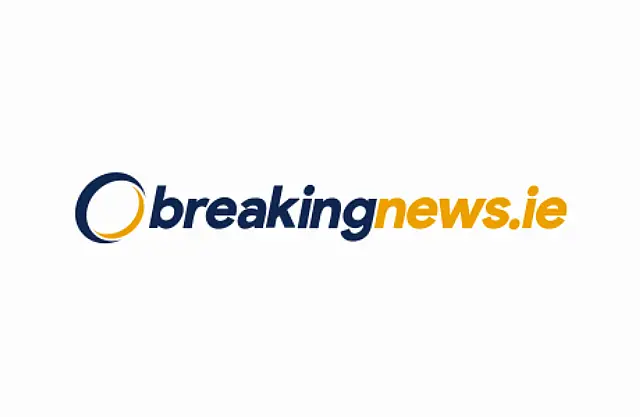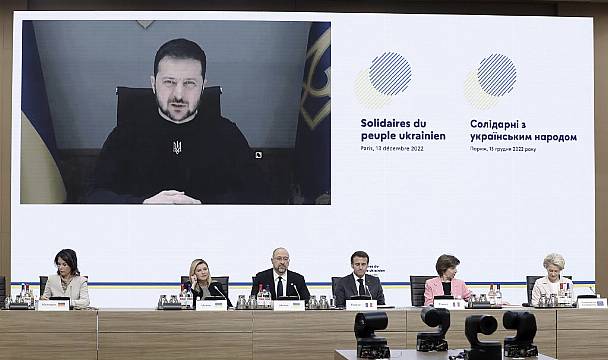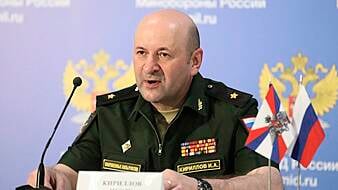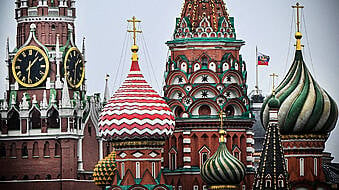Dozens of countries and international organisations have pledged more than one billion dollars (£0.8 billion) to keep Ukraine powered, fed, warm and moving in the face of sustained Russian aerial bombardments that have plunged millions into the cold and dark in winter.
An international donor conference in Paris is raising and helping co-ordinate many tens of millions of pounds of aid – both financial and in kind – to be taken to Ukraine in coming weeks and months to help its beleaguered people survive winter’s freezing temperatures and long nights.
French president Emmanuel Macron, in a speech opening the conference, described Moscow’s bombardments of civilian targets as a war crime.
He said the Kremlin is attacking civilian infrastructure because its troops have suffered setbacks on the battlefields.

Moscow’s intention is to “plunge the Ukrainian people into despair”, Mr Macron said.
Ukraine’s president Volodymyr Zelensky, who spoke by video link, said 12 million Ukrainians are suffering power cuts.
He said the country needs electricity generators as urgently as it needs armoured vehicles and armoured vests for its troops.
As temperatures plunge and snow falls, Ukraine’s needs are huge and pressing.
Successive waves of missile and drone attacks since October have destroyed about half of Ukraine’s energy infrastructure, the government in Kyiv says.

It says Russia is trying to create a fresh wave of refugees to Europe.
Russia says striking civilian infrastructure is intended to weaken Ukraine’s ability to defend itself.
In Ukraine, life for many is becoming a battle for survival.
“Globally we need everything,” said Yevhen Kaplin, who heads a Ukrainian humanitarian group, Proliska, providing cooking stoves, blankets and other aid to frontline regions and away from the battlefields.
With “the shelling, the missile strikes and strikes on the infrastructure, we can’t say whether there will be gas tomorrow, we can’t predict whether to buy gas stoves or not”, he said.

“Every day the picture changes.”
Specifically, the Paris conference is to focus on helping Ukraine meet its need for water, power, food, health and transport during the coming months through to the end of March.
The meeting’s French organisers say the aid drive will also send a message to the Kremlin that the international community is sticking by Ukraine against Russia’s aerial bombardments that have savaged the Ukrainian power grid and other key infrastructure.
Sweden was among the first countries attending the meeting to pledge more aid.
Foreign trade minister, Johan Forssell, announced a contribution of 55 million euros (£47 million) for humanitarian aid and the rebuilding of schools, hospitals and energy infrastructure.
L’Ukraine n’est pas seule. https://t.co/3LeWzDku16
— Emmanuel Macron (@EmmanuelMacron) December 13, 2022
As winter bites, “we need to do whatever we can to help improve conditions in Ukraine and also help them to fight off the Russian invaders”, he said.
“We’re here for them as long as it takes.”
Donors went to the conference armed with an array of help, from lightbulbs, generators and power transformers to assistance with food, water, health, transport and rebuilding.
France’s foreign ministry said a total of 1.05 billion euros (£840 million) in financial and in-kind aid was pledged, all of it expected to reach Ukraine over the toughest winter months before April.
European Commission president Ursula von der Leyen announced funding for the purchase of 30 million energy-saving light bulbs that Ukraine requested to reduce pressure on its power grid.
The meeting also aims to put in a place a system to co-ordinate international aid this winter, mirroring the way that western nations supplying weapons co-ordinate their military support.
A web-based platform will enable Ukraine to list its civilian aid needs, and allow donors to show what they will supply in response.
The conference organisers say they are expecting more than 45 nations and 20 international institutions to take part.
Meanwhile, the UK imposed travel bans and asset freezes on 12 more Russian senior military figures it links to the infrastructure attacks in Ukraine.
They include commanders of the strategic missile and airborne forces, and other officials in charge of missile and drone units.
The Foreign Office also announced restrictions on three Iranians and a company allegedly involved in supplying explosive drones to Russia.







